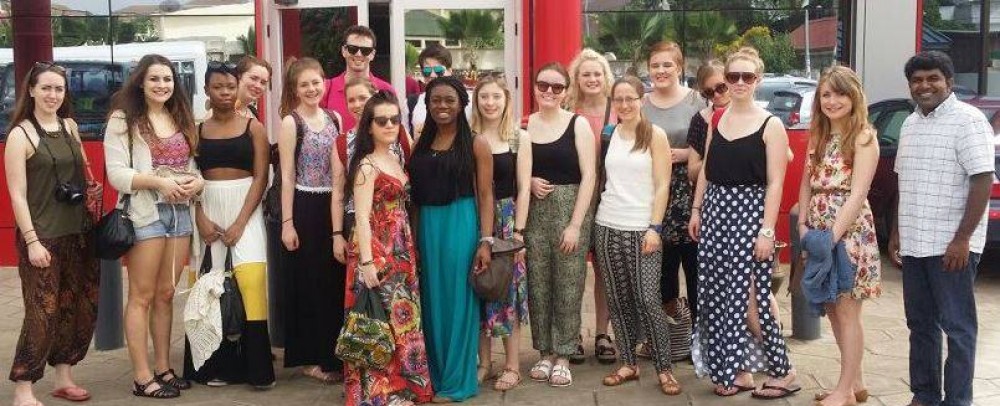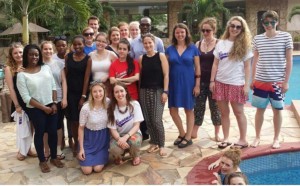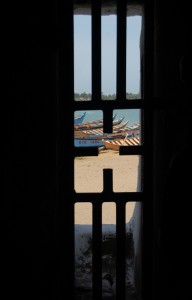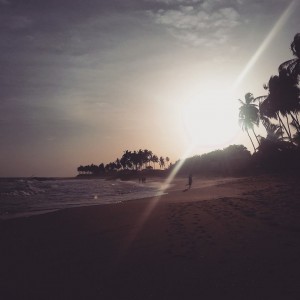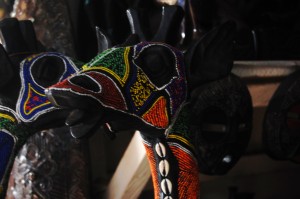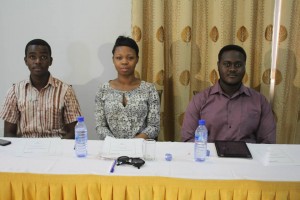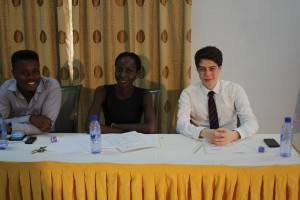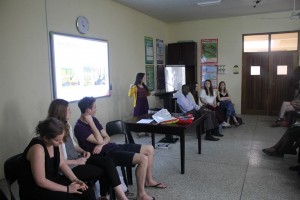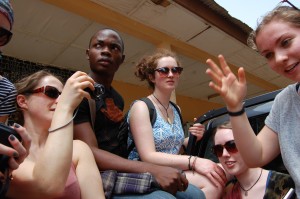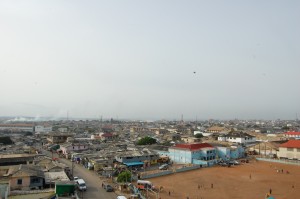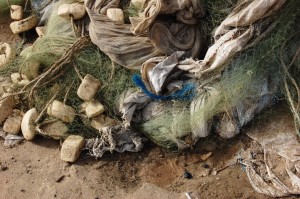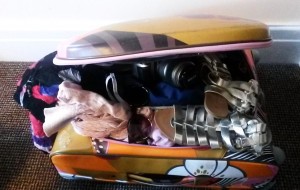It’s been a month now since we returned from our phenomenal week in Ghana, and every day I am reminded about our trip in some way. Whether it be from writing this blog, receiving a message from a friend in Ghana, glimpsing the sunshine for a full five minutes, admiring my Ghanaian painting, or gazing wistfully at my redundant bottles of suncream, my experiences from the week still constantly creep into my mind as I try and focus on revising for our upcoming exams. We didn’t embark on this trip looking for a life-changing experience, whether that be to better us, or to change other people’s lives. We didn’t go to ‘find ourselves’. We went ostensibly as tourists, to experience and enjoy the country, and to partake in an educational exchange with our partner university. I was met with some surprise and, in one instance, criticism, when people back home found out that I wasn’t going to ‘Africa’ as part of a charity campaign, or to go and volunteer in a place which, frankly, would not have benefited from a coach-load of English students attempting to gratuitously implement change based upon our Western ideals. I am just thankful for having had the invaluable opportunity to travel to a country I knew nothing about, that we had our misconceptions of Africa as one, homogeneous nation challenged, and that I will now take every opportunity to embrace all opportunities that come my way. So thank you, LU Ghana for your kindness, hospitality, wicked sense of fun, and for the vitamin D boost to get us through the temperamental British summertime.
Thank you for the best week of my life.
Days 6-7 Fired up, not ready to go home…
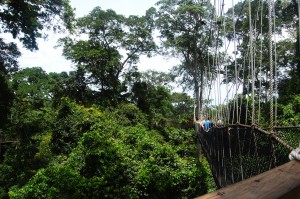 For a group of lethargic university students, still suffering from the adverse effects of the cuisine from the day before, I think we should have been applauded for our efforts to be ready and waiting for the bus to Cape Coast at 6am. An hour and a half later, after several extra trips to the breakfast buffet and countless re-applications of deet and suncream, our bus arrived. Pretty punctual by some standards. After a five hour drive, and a communal bonding trip to one of the most unsavoury toilet facilities I have ever experienced (worse than our library toilets!), comprising 3 tiled walls, no drainage system or doors and a complementary fro
For a group of lethargic university students, still suffering from the adverse effects of the cuisine from the day before, I think we should have been applauded for our efforts to be ready and waiting for the bus to Cape Coast at 6am. An hour and a half later, after several extra trips to the breakfast buffet and countless re-applications of deet and suncream, our bus arrived. Pretty punctual by some standards. After a five hour drive, and a communal bonding trip to one of the most unsavoury toilet facilities I have ever experienced (worse than our library toilets!), comprising 3 tiled walls, no drainage system or doors and a complementary fro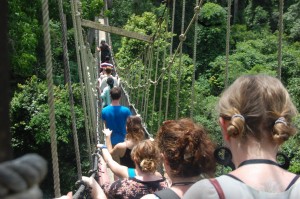 g, we arrived at Kakum National Park. After the dry heat of Accra, and the air-conditioned bus, the humidity hit us even harder than the complementary local shots we sampled at Republic Bar the previous Tuesday. It was intense.
g, we arrived at Kakum National Park. After the dry heat of Accra, and the air-conditioned bus, the humidity hit us even harder than the complementary local shots we sampled at Republic Bar the previous Tuesday. It was intense.
Drenched in an unholy amount of insect repellent and sweat, we ascended the steep incline up to where we would start our canopy walk. After being overtaken by three young school parties, we reached the starting base for our walk: a wooden base with swaying rope bridges suspended 130 feet above the ground. 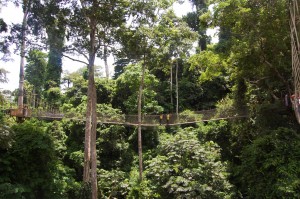 Stepping tentatively onto the bridge I realised that if it collapsed I would fall 26.2 times my height through a lush evergreen canopy past the 400 species of butterflies and 200 species of birds and reptiles to my imminent death, where I would probably be cleared up by one of the 40 different species of mammal that abide in the park. A comforting thought. My vertigo was quickly overcome, however, by the phenomenal views from the walkway, from which you could see the canopy below, a variety of butterflies up close, and some of the taller trees standing proudly along
Stepping tentatively onto the bridge I realised that if it collapsed I would fall 26.2 times my height through a lush evergreen canopy past the 400 species of butterflies and 200 species of birds and reptiles to my imminent death, where I would probably be cleared up by one of the 40 different species of mammal that abide in the park. A comforting thought. My vertigo was quickly overcome, however, by the phenomenal views from the walkway, from which you could see the canopy below, a variety of butterflies up close, and some of the taller trees standing proudly along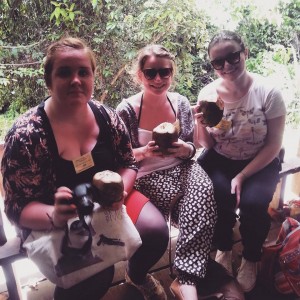 side us at 60m tall! On our way back down through the jungle we were reunited with the multitude of school children, eager to introduce themselves and chat about how much they’d enjoyed the scary walk. For just one cedi – 20p – we could buy a freshly machete’d coconut to rehydrate ourselves, which makes one rather bitter about paying £4 for a carton in Sainsbury’s.
side us at 60m tall! On our way back down through the jungle we were reunited with the multitude of school children, eager to introduce themselves and chat about how much they’d enjoyed the scary walk. For just one cedi – 20p – we could buy a freshly machete’d coconut to rehydrate ourselves, which makes one rather bitter about paying £4 for a carton in Sainsbury’s.
After another long drive through the countryside’s astoundingly contrasting greens, oranges and reds, we arrived at Elmina where we were to visit the Castle. The building was originally erected by the Portuguese in the 15th century as a trading port, before a lucrative slave trade was established, continued by the Dutch who took over and subsequently the British. It was heart-wrenching to learn of the atrocities inflicted upon the people of West Africa who were trafficked over the period of half a century in their millions by the Europeans. We saw the dingy cells that would host hundreds of people at a time, and perhaps worst of all, the ‘door of no return’. The individuals that survived their 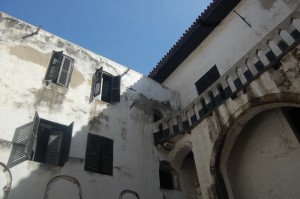 weeks or months in captivity would be filed through the door to slave ships bound for Europe and the Americas, a journey which only one in three of them would survive. After the harrowing tour of the castle we continued up the coach for dinner at a hotel and a final beach trip as the sun set.
weeks or months in captivity would be filed through the door to slave ships bound for Europe and the Americas, a journey which only one in three of them would survive. After the harrowing tour of the castle we continued up the coach for dinner at a hotel and a final beach trip as the sun set.
On our last morning we were able to explore a local craft market, where we could fine-tune our bartering skills and fill our suitcases with jewellery, clothes and souvenirs. After proudly displaying our ‘bargain’ finds to some of our LU Ghana friends, we discovered that we had been completely ripped off and charged ‘Obroni’ (foreign person) prices, paying at least 4 X the products’ worth. We weren’t too concerned by this, as the prices we paid were still cheap, and we were pleased with our finds! After a final meal at the hotel, we had to say goodbye to Jemima and Stan, who had been our rocks throughout the trip, heading off into the night for our return to rainy Blighty…
Day 5 – Working hard, or hardly working?
Thursday brought with it the eagerly awaited inter-university debate between LU Ghana, the University of Ghana, and Lancaster University. The two debating teams had one representative from each of the universities, whose task was to debate whether or not Africa should receive reparations from the West on account of the slave trade. Sharn and Anthony had been working hard to prepare their arguments over the course of the week, and we were seriously impressed with the rhetoric and conviction of both teams. After questions were posed from the audience, it was ultimately decided that the team debating in favour of reparations were the overall winners.
As both teams had worked so hard to prepare their contributions to the debate, it seemed only fair to take the rest of the day off and go to the beach en masse. We discovered on arrival that were to be spending our afternoon in paradise, as we piled into a wooden boat to be transported to a private island. The ensuing hours were spent swimming, eating kebabs, k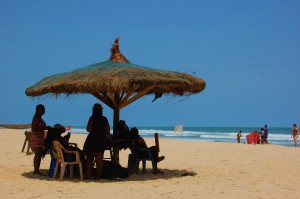 eeping the bar in business, drowning our sunglasses (Ollie!) and topping up on our fiery sunburn. It’s a hard life. The only minor downside to this glorious beach was its toilet facilities… The available portaloos rivaled those at notable British music festivals in the sanitation department and the alternative was the intriguingly named ‘Ladies’ Urinal’, which turned out to just be a cordoned off square on the beach where you could go as nature intended…
eeping the bar in business, drowning our sunglasses (Ollie!) and topping up on our fiery sunburn. It’s a hard life. The only minor downside to this glorious beach was its toilet facilities… The available portaloos rivaled those at notable British music festivals in the sanitation department and the alternative was the intriguingly named ‘Ladies’ Urinal’, which turned out to just be a cordoned off square on the beach where you could go as nature intended…
I was dismayed later that evening when the impressive tan I had mysteriously only developed on my feet disappeared down the drain in the bath. Turns out I was just disgustingly dirty from wearing sandals for the day.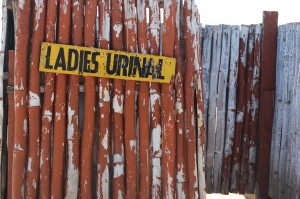
Many of the group were so tired from the day’s serious over-exertion at the beach that they headed straight to bed after another eye-wateringly hot dinner. The rest of us stayed up to greet our LU Ghana friends who came to catch up by the pool, conveniently forgetting about our inhumanely early start in the morning.
Day 4
Wednesday took on a slower pace, which, after three days of early starts and late nights, 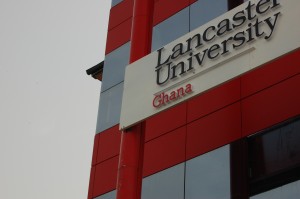 was greatly appreciated. Feeling slightly worse for wear, with Bohemian Rhapsody tuned tinnitus resounding in our ears, we arrived at LU Ghana, where each faculty would be presented with specialised lectures. The English language lecture was given by Grace Diabah from the University of Ghana, who had studied at Lancaster University herself. She provided us with a fascinating insight into the presentation of male sexual power in Ghanaian radio adverts. While the term ‘thought provoking’ is bandied about a lot, the number of questions and depth of discussion following the lecture were demonstrative of how much Grace had taught us in the hour long talk. Following our subject specific lectures, the Law society presented some talks for us. These were more interactive than our lectures back home, which was facilitated by the considerably smaller lecture sizes – comparable to our seminars. The afternoon was to be filled with school visits, so those of us who were less well read on legal jargon used the lecture time to prepare a powerpoint about our Lancaster experience.
was greatly appreciated. Feeling slightly worse for wear, with Bohemian Rhapsody tuned tinnitus resounding in our ears, we arrived at LU Ghana, where each faculty would be presented with specialised lectures. The English language lecture was given by Grace Diabah from the University of Ghana, who had studied at Lancaster University herself. She provided us with a fascinating insight into the presentation of male sexual power in Ghanaian radio adverts. While the term ‘thought provoking’ is bandied about a lot, the number of questions and depth of discussion following the lecture were demonstrative of how much Grace had taught us in the hour long talk. Following our subject specific lectures, the Law society presented some talks for us. These were more interactive than our lectures back home, which was facilitated by the considerably smaller lecture sizes – comparable to our seminars. The afternoon was to be filled with school visits, so those of us who were less well read on legal jargon used the lecture time to prepare a powerpoint about our Lancaster experience.
Lunch was eaten in a tutorial room, and comprised a selection of Ghanaian dishes…and spaghetti bolognese. Our palates were still adjusting to the spiciness of the local food, and we had learnt over the course of the week that vegetarian dishes are somewhat of a rarity in Ghana. The vegetable curry for instance, contained a healthy portion of chicken to ensure our veggie friends didn’t miss out on their protein.
Post-superhotlunch, we split into groups and went to two local schools. The group that went to Corpus Christi school were overwhelmed by the enthusiasm of the pupils, who, after their talk, requested all their contact details so that they could find out more about the university experience. The pupils at the international school that the Linguistics and some Law students visited were slightly older, and clearly ready to go home by the time we arrived to give them our talk. As student ambassadors, we explained Lancaster University’s collegiate system, talked about the available extra curricular activities, gave an insight into the local area, and ensured they were left in no doubt as to Lancaster’s depressing meteorological conditions.
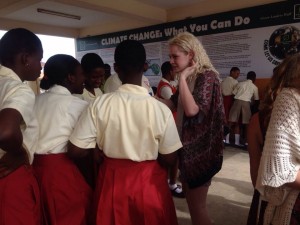
Jess chatting to Corpus Christi students
Our evening activity today was a visit to a church service, held in a hotel. It was honestly like nothing I have ever experienced. As we were now well-rehearsed at karaoke, we joined in enthusiastically with the sing-along screen displaying all the words to the hymns. Despite having no faith myself, it was clear to see how important these services were to the members of the congregation, and how genuine and enthusiastic their faith was. Within no time we were dancing and clapping along, and at one point there seemed to be some sort of mosh pit forming at the front of the room – thankfully for everyone else in the room I decided to refrain from busting out some of my best Sugarhouse moves in time to the hymns. After a considerable amount of singing came the sermon, during which I am assured all of us stayed wide awake and alert. After being there for over an hour we made our getaway when the congregation began talking in tongues, and were greeted by the priest as we tried to leave surreptitiously through the carpark. Exhausted by our enthusiastic participation in the Ghanaian church experience, we headed back to the hotel.
Charlotte Davey
Day 3 – Pineapples, Prison and Pizza
For many of us, Tuesday was an exhaustingly long day. Having left the hotel at 7.30, the group split into two faculty-based sections. Joined by members of the LU Ghana Law Society, the law students and Catherine departed for Nsawam prison. Accompanied by Anderson, Claire, and some of our friends from LU Ghana, the PPR and Linguistics students were driven out into the sticks to a pineapple farm.
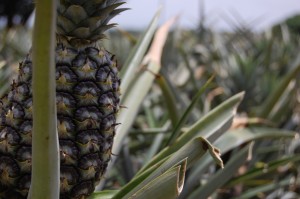 It is difficult to convey something experiential through words and pictures alone, but I shall do my best. On arrival at the farm, we left the comforting breeze of the air conditioned bus and stepped into a heat that engulfed us like some sort of fiery, sweaty hug that clinged to the pores of your skin and followed you relentlessly. The farm manager introduced himself and explained that his 4X4 pick-up truck was the only vehicle that would be capable of transporting us across the farm. By my count, eighteen of us crammed into the truck, praying that our insurance would cover the coccyx damage incurred as we flew merrily over potholes whilst seated in the bed of the trailer, tilted sideways at 30°. Some of the farm workers were fertilizing the pineapples when we made our first stop, and we learnt that in a single day they could fertilize as many as 10,000 plants! The workers planted the pineapples with such speed and precision they made it look easy, so we decided to try have a go at it. Feeling invincible after our off-roading experience, and wielding scythes and plant tops, we risked life and limb to try planting too. It turns out that it wasn’t actually easy, the farmers were just considerably more skilled than us and could plant the pineapples with 10X as much speed and accuracy as we could. Then again, they were wearing gloves…
It is difficult to convey something experiential through words and pictures alone, but I shall do my best. On arrival at the farm, we left the comforting breeze of the air conditioned bus and stepped into a heat that engulfed us like some sort of fiery, sweaty hug that clinged to the pores of your skin and followed you relentlessly. The farm manager introduced himself and explained that his 4X4 pick-up truck was the only vehicle that would be capable of transporting us across the farm. By my count, eighteen of us crammed into the truck, praying that our insurance would cover the coccyx damage incurred as we flew merrily over potholes whilst seated in the bed of the trailer, tilted sideways at 30°. Some of the farm workers were fertilizing the pineapples when we made our first stop, and we learnt that in a single day they could fertilize as many as 10,000 plants! The workers planted the pineapples with such speed and precision they made it look easy, so we decided to try have a go at it. Feeling invincible after our off-roading experience, and wielding scythes and plant tops, we risked life and limb to try planting too. It turns out that it wasn’t actually easy, the farmers were just considerably more skilled than us and could plant the pineapples with 10X as much speed and accuracy as we could. Then again, they were wearing gloves…
The farm has massive international export demands, planting and exporting hundreds of thousands of pineapples every month after they have been fertilized and forcibly ripened over short periods of time. The quality demands are fiercely strict, but thankfully, many of the pineapples that do not meet supermarket’s qualitative or aesthetic demands are made into juice or tinned, as opposed to wasted. When we were in Ghana, the exchange rate from cedis to pounds was around 5-1, and at the farm a standard worker may earn just 8 cedis per day! While living costs in Ghana may be cheaper, this still seemed seriously low considering the intense heat, high quotas, and long hours in which the farmers are expected to work. The hawks that had been circling ahead of us seemed to be eyeing us up as we slowly roasted in the lunchtime heat of the equatorial sunshine, so after a tour of the factory, we piled back into our van, relishing the leg-room, and headed off for the Village of Hope.
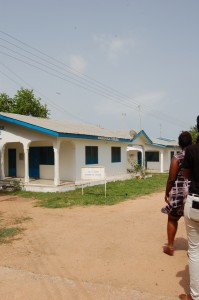 The views of rural Ghana were phenomenal, as we drove through the leafy green countryside that contrasted so vividly with the hot red soil and monolithic termite mounds. The Village of Hope is a charitably run organisation housing pre-, primary, and secondary schools, a boarding sixth form, a children’s home, farm, clinic and hospital on a vast and beautiful campus. In Accra itself, the Village also runs a vocational training centre for former street children who may want to go into more practical professions instead of Higher Education. The pupils produce excellent results, and it seems this may be due to the warm (figuratively and literally) and caring environment in which they learn. The orphans who live on campus all attend the school there, alongside children from the surrounding communities. Those who live in the orphanage are cared for by husband and wife partners who act as parents to a house of twenty children. The Village was so tranquil and calm (presumably because the children were still at school) and it was a real shame to leave behind such a strong, caring community.
The views of rural Ghana were phenomenal, as we drove through the leafy green countryside that contrasted so vividly with the hot red soil and monolithic termite mounds. The Village of Hope is a charitably run organisation housing pre-, primary, and secondary schools, a boarding sixth form, a children’s home, farm, clinic and hospital on a vast and beautiful campus. In Accra itself, the Village also runs a vocational training centre for former street children who may want to go into more practical professions instead of Higher Education. The pupils produce excellent results, and it seems this may be due to the warm (figuratively and literally) and caring environment in which they learn. The orphans who live on campus all attend the school there, alongside children from the surrounding communities. Those who live in the orphanage are cared for by husband and wife partners who act as parents to a house of twenty children. The Village was so tranquil and calm (presumably because the children were still at school) and it was a real shame to leave behind such a strong, caring community.
We were seriously hungry by this point, and made an emergency pit stop for pizza on the way back to the hotel. One of my favourite things about Ghana was the continual supply of snacks available when sat in a hot vehicle in slow traffic. There are hundreds of street sellers on the main roads selling a multitude of goods including food and drink, so our favourite plantain chips were always readily at hand for a fraction of the price of a packet of crisps back home! When we arrived back at the hotel we discovered that in our absence, the Law students had been working seriously hard…on their tans…by the pool. In their defense (geddit?!) it turns out their morning had been more traumatic than our stunt driving experience. They had visited Nsawam Prison, a Medium-Security prison whose conditions sounded horrific.
After supper at the hotel we headed out to meet our friends from LU Ghana at a karaoke bar and grill called Republic. We all flatly refused to join in with the karaoke, but the local shots proved to be surprisingly persuasive… Before long, a selection of the group – who for the preservation of their dignity shall remain nameless – were treating the surrounding area to loud, enthusiastic renditions of songs that they shall never want to listen to again…
Days 1-2 – ‘Fired up, ready to go!’
After departing a chilly Lancaster at 6.30 as the sun was rising, then leaving Amsterdam in transit at a balmy 4°C shrouded in jumpers, the heat on arriving in Accra was stifling – like the wave of hot air that hits you in the face on opening the oven door. We were split into two groups, the second of which was left at the airport after being assured that their bus was on its way. We soon learnt that this was an indirect way of saying that actually the hotel had only sent one bus for all of us, and the elusive “second bus” was in fact the same vehicle on a return trip after depositing the first group and an array of luggage at the hotel. By 10pm we were all reunited, and after discovering our gorgeous rooms and, equally importantly, the hotel swimming pool, we began minesweeping our way through the buffet dinner more eagerly than Pacman through a maze.
We were awoken early on Monday morning by a cacophony of car horns, which would become a recurring motif on our trip. Our first stop of the day was Lancaster University Ghana, where we were presented with a number of talks courtesy of the Law Society exploring what is meant by ‘the spirit of the law’. Our most valuable piece of advice for the trip (aside from how slight positional differences in doing a ‘thumbs up’ can change it from a positive gesture to making implications about one’s mother) was given to us by Dr Cynthia Forson, Deputy Provos, who told us to ‘close our Western eyes’ and see things from a Ghanaian perspective. This was sound advice to follow, enabling us to relax and experience everything fully and objectively. In doing so, we also learnt to ignore our Western watches and adopt a more fluid approach to time keeping (even by the standards of Lancaster’s bus service…).
After mingling with the LU Ghana students over a shared buffet (we do love free food) we were whisked away by our bus to a Ghanaian restaurant for our fourth buffet in 24 hours. Stuffed with plantain, rice, and various types of stew we waddled on to the National Museum of Ghana. It was fascinating to learn more about Ghana’s history, and many of the artifacts on show, including musical instruments, were free to be handled, resulting in a much more participatory, engaging, and less sterile approach than I have experienced before at museums. The afternoon heat was too much for many of us, and we were thankful for our bus’s air conditioning as we drove round the city en route to Jamestown, an old seaside fishing community. As we drove through the city, it was interesting to note that the president’s palace we passed had been built to emulate the shape of the stools used by Akan chiefs that we had seen in the museum.
We explored Jamestown on foot, navigating through the hustle and bustle of people cooking and smoking fish, goats looking as lost as we were, chickens eating up scraps, and children running past us and hurling themselves with alarming gusto into the sea. We rounded off our walking tour with a trip up the lighthouse. This was not for the faint hearted or those with a fear of heights, and was, quite frankly, terrifying. After winding our way up the 82 steps of the spiral staircase we were faced with a wooden ladder missing several of its rungs, which we would have to climb in order to reach the top of the tower. Needless to say, I regretted wearing a dress, and my ascent was less than dignified. The heart palpitations and cold sweat when looking over the edge were, mercifully, well worth it for the phenomenal views from the top. We could see right over Jamestown to the sea, and into Accra from the other side as the sun began to set over the city.
When dinner was over we headed down to Bedouin Lounge for a few ‘quiet’ drinks with our new friends from LU Ghana. The bar itself was gorgeous, and we all sat outside in a paved area complete with a burger shack, drinks and shisha bar. The heat of the evening made for a far more pleasant atmosphere than shivering around a patio heater in Lancaster. After sharing some celebratory cocktails we were bonding over a game of “never have I ever”. It was an enlightening experience, and one which I shall divulge no more of on this blog. What happens in Ghana, stays in Ghana.
Charlotte Davey
Day -1
By my watch, it is 15 and a half hours until we leave Lancaster for Accra, and I am writing this post balanced precariously on top of my suitcase in a vain attempt to close it shut over the vitally essential sarong and extra pair of shorts that I have attempted to cram into my bag…
We have a packed itinerary awaiting us over the next week, with trips to a museum, a castle, the beach, and a national park planned. As well as this we will attend a church service, university lectures, an inter-university debate, and a pineapple factory(!) I am, like many of the others, ridiculously excited, slightly nervous, and, as usual, desperately unprepared. Acquiring essentials for the trip has proved to be an interesting challenge on the tail end of my
student loan, and on seeing the price of suncream and deet insect repellent, I quite seriously had to consider selling a few of my less vital organs to fund these necessities. In the end I decided I would simply have to forsake the £15 factor 50 with added moisturiser and instead buy Boots’ last 2 bottles of extra-reduced children’s suncream for £2 on buy-one-get-one-free. Bargain – bring on the sunshine! For the past fortnight I have been collecting useful things for the trip and letting them accumulate in a mountainous heap on my bedroom floor. With my suitcase at the ready I decided to tackle said pile, which, on removing one item, collapsed around me like a set of Jenga that primarily comprised underwear and After-Sun lotion. This was not a good start, and has acted as a greater incentive to leave the chaos that is my flat in Lancaster for our hotel in Ghana as soon as possible.
As time is running out, I shall end this post and attempt to excavate my passport from the museum of curiosities that my desk has become over the past term. I should probably attempt to brush up on my Twi phrases as well, as so far I only know ‘mɛto kubeh‘, which I am told means ‘I will buy a coconut’ …
Charlotte Davey
